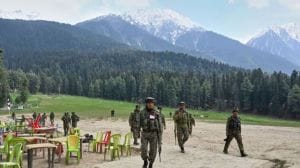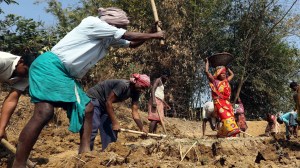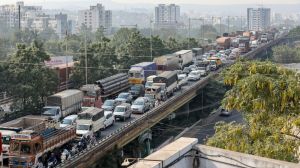Lok Sabha polls: Development a poll issue in Bastar where Naxal shadow looms large
The Congress has fielded six-time MLA and former minister Kawasi Lakhma, 70, from the Bastar seat, while BJP candidate Mahesh Kashyap, 49, is making his poll debut.
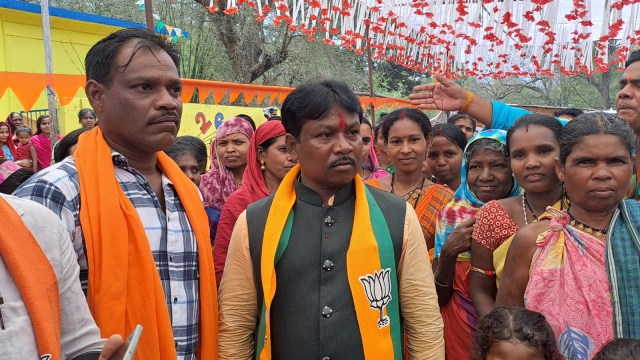 BJP candidate in Bastar Mahesh Kashyap. (Express photo by Jayprakash S Naidu)
BJP candidate in Bastar Mahesh Kashyap. (Express photo by Jayprakash S Naidu)Chhattisgarh’s Bastar is set to be the state’s sole seat going to polls in the first phase on April 19 owing to Maoist violence — already this year, left-wing extremism (LWE) has claimed 74 lives till April. Of the 74 killed, 50 were Maoists, which is more than twice the number across 2023, when 24 insurgents were killed.
The Bastar Lok Sabha seat falls in the state’s Abujhmad region, an unsurveyed area larger than Goa and with a population of about 40,000 that is still a Naxal stronghold. While development in the region, which lacks railway connectivity, super-speciality government hospitals and access to welfare schemes, is a key poll issue, candidates are also targeting each other over left-wing extremism.
The Congress has fielded six-time MLA and former minister Kawasi Lakhma, 70, from the Bastar seat, while BJP candidate Mahesh Kashyap, 49, is making his poll debut.
Kashyap in his speeches has linked Lakhma to Naxalism. “He (Lakhma) escaped the Jhiram Ghati incident (a 2013 Naxal attack that killed several Congress leaders), while all senior leaders died. Why does he keep winning from a Naxal-affected area? Our Bastar is getting a bad name in the country due to Naxals. If he becomes a parliamentarian then you can imagine what happens to Bastar?” Kashyap said at a public meeting in Bailkonta village last week.
 Public gathering addressed by Prime Minister Narendra Modi for the Lok Sabha elections in Bastar on Monday. (Image source: ANI Photo/File)
Public gathering addressed by Prime Minister Narendra Modi for the Lok Sabha elections in Bastar on Monday. (Image source: ANI Photo/File)
But in an interview with The Indian Express, Lakhma compared recent police encounters by the BJP state government to the Silger incident in Sukma district, where three villagers were killed in police firing in 2021. “During Congress rule only one Silger incident took place. But this year over 10 such incidents took place,” Lakhma said.
The BJP had won Bastar from 1998 until 2019. The party’s Baliram Kashyap represented the seat from 1998 until his death in 2011. His son Dinesh Kashyap won it in 2014. The BJP’s winning streak was ended by the Congress’ Deepak Baij in 2019, when he won with a margin of 38,982 votes.
Though Bastar has been seeing a bipolar contest between BJP and Congress, the CPI and the BSP may prove to be significant for determining the poll outcome. In 2019, about 41,667 chose the NOTA option, followed by the CPI who got 38,395 votes. The BSP got 30,449 votes.
Kashyap believes that the BSP has become weak, adding that “due to Prime Minister Narendra Modi’s guarantees”, he will be “able to pull CPI and NOTA votes”.
“I will win by a margin of 1.5 lakh to 2 lakh votes. Lakhma will know what real election is for the first time,” Kashyap claims.
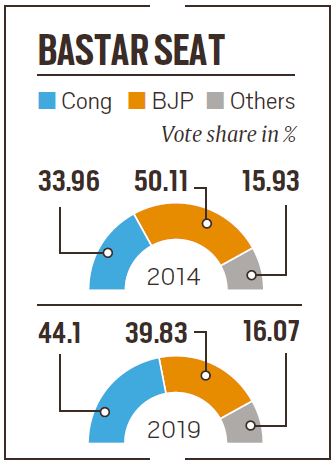
Development issues
Talking to The Indian Express, Kashyap says among his “top priorities” are a railway line till Jagdalpur, greenlighting the construction of a four-lane road till Jagdalpur and the construction of super-speciality hospitals.
“There are no good hospitals in Bastar and people go to Visakhapatnam or Raipur for treatment. Indravati river is our lifeline but water is getting diverted towards the jungle in Odisha. I plan to ensure there is no water crisis in future,” he says.
Lakhma told The Indian Express: “There is no railway line connecting Bastar with Raipur. There should be two – one connecting Chhattisgarh with seven districts which this Lok Sabha seat covers, and another connecting it with Bhadrachalam and Warangal in neighbouring Telangana. I want Bastar to be connected with all major cities in India.”
Several civil society activists in the area also speak of the development challenges that the region faces.
Basant Lal Jha, who has been associated with the cause of education in Bastar for years and has founded two colleges and helped build four schools in Bastar, speaks of the “quality of teachers”. He adds that quality education is key in the Naxal-affected area.
A senior civil surgeon working in a government hospital in Bastar speaks of many patients in the region being “referred to avail treatment elsewhere”.
He says: “In remote villages, we need to develop a telemedicine system so specialist doctors sitting in command centres can attend to patients. We need to make sure doctors are available in remote areas and a super-speciality hospital needs to be made operational soon and strengthened.”
Five-time ex-North Bastar MP Arvind Netam, a former Union minister in the Indira Gandhi Cabinet, flags “employment” and “climate change” as major issues.
“Due to deforestation of especially Sal trees and mining activities, there is a lot of water and air pollution. In the years to come, there will be a crisis for drinking water… Where will these tribals go when they lose their jal, jungle and zameen (water, forest and land)?”
- 01
- 02
- 03
- 04
- 05








